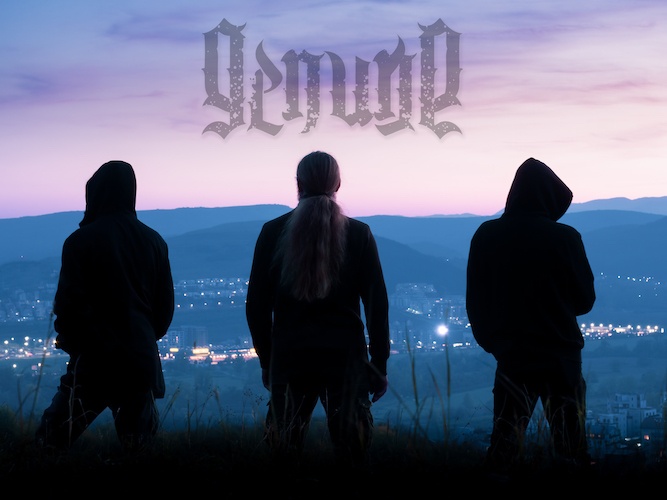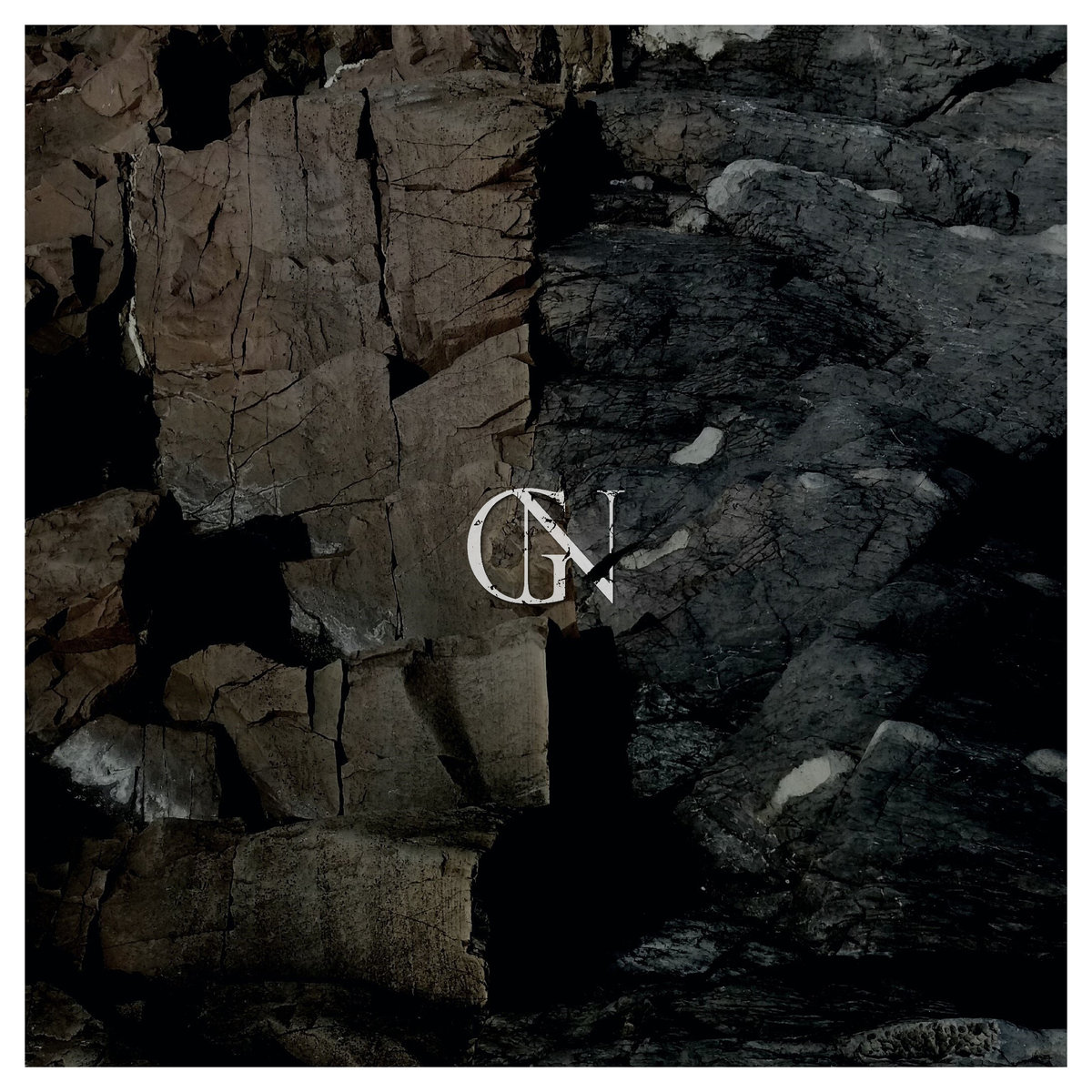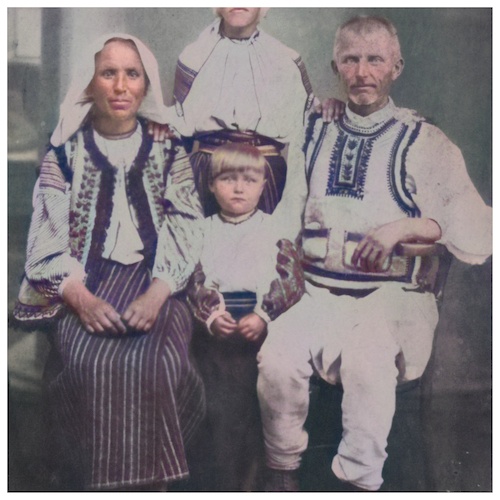
(Comrade Aleks has brought us the following interview with guitarist Dragos of the fine Romanian black metal band Genune, whom we’ve praised repeatedly here at NCS.)
Genune means “chasm” or “abyss” in Romanian. It’s a fitting name for a black metal band but this trio isn’t one of those straightforward acts who praise the joys of nihilism and hatred. Dragos (guitars), Cosmin (guitars) and Istvan (vocals, bass) are rather into this modern melancholic way of interpreting the genre which helps to stream their energy not only through common aggressive channels but also through more fragile and elegant “atmospheric” decorations.
Placed somewhere in-between Bacău and Cluj-Napoca, Genune released their second album Inert & Unerring in April 2021 and it sounds like a reflection on themes of feeling and being in this very place. It’s easier to understand Genune when you watch the band’s official videos and, of course, when reading this interview we made with Dragos.
Hi Dragos! How are you? What’s new in the band’s camp?
Hi Aleks & NCS team, we’re doing good, all things considered. We have a new drummer in the band, his name is Abel, and have started some rehearsals, after more than 2 years. Depending on how things evolve, we may start planning some live shows as well.
Yes, you did record before with Daniel Neagoe, and I believe he’s occupied with other things now. How difficult was it to find a new drummer in your city?
Daniel was part of the band for a while and he helped us, among other things, with the logo we currently use, but he didn’t record the drums, they were programmed with midi. We were also unfortunately not able to rehearse together as he lives in another city. Finding a drummer who can play aggressively but also with feel and nice cymbal work is not that easy. Luckily Abel is capable of everything the band requires, and I’m happy that we managed to finally recruit him. I had my eyes on him in 2018 already, but he spent some years in the US and only returned this year.

Next year marks your first decade as a band, so how did it start for you? How were you involved in black metal?
Indeed, we’ve been around since 2012, but I’d rather consider 2018 as our ‘first’ year, when we released Cern Sol and completed the lineup for the first time. Before that, Cosmin and I played in a Funeral Doom Metal band and Istvan in a few other bands too, so Genune was not strictly the main focus – although I was already writing songs for the band and putting the first album together.
Regarding how we got involved with black metal, Cosmin and Istvan say that they got gradually more exposed to it in the ’90s, through tapes, friends and underground magazines. Abel and I were not old enough in the ’90s to listen to black metal and I suppose that we did not discover it through tapes as much as through illegally procured mp3’s a decade or so later, with otherwise the same recipe of friends and online media further exposing us to it. Abel came from a religious family background, so his discovery of black metal started with Antestor, mine with a fascination for Norway and the Middle Ages.
Genune is simply the consequence of us sharing a common interest.
Cosmin is into Descend into Despair still, as you left the band some time ago. Didn’t you have time or energy for another project?
I left Descend into Despair strictly because playing that music required in-ear monitoring, and given my tinnitus, I had concerns it would cause more damage. This is the same reason I have some reservations about playing live with Genune. Cosmin has also left Descend into Despair.
Genune was formed in 2012, but you took a five-year pause after releasing two demos, Genune (2012) and Inner Depths (2013). How did you spend this period?
That pause was spent mostly writing music and learning the ins and outs of recording a half-decent album, production-wise. I recall that we rehearsed with a few people in 2014, trying to coalesce the band into something a bit more real, but we didn’t click with the people we invited, so Cosmin and I eventually decided to just focus on writing and producing an album first. Those two first demos are also fairly weak, to be honest. It was better to spend the time honing both our compositions and recording skills.
The Cern Sol album saw the light of day in December 2018. And you did state it yourself: “primarily a black metal work, but with influences ranging from post-metal to neofolk, with occasional progressive tendencies”. How did it all come to this?
It’s mainly because those songs were written in the span of 5 years, during which I listened to a lot of different bands that later became part of our influences. For example, ‘Cerul Necurmat’ is the oldest song and was written around the same time as the ‘Inner Depths’ song in 2013. ‘Serile Ard’ was initially meant for another black metal band I was playing with in 2015, that never came to fruition. The last song on the album, ‘Nord’, I wrote in 2016 while doing a semester of university in Norway, when I had no guitar and had to use Guitar Pro to sketch it. ‘Wilderness7’ was written in 2017.
A lot of time passed between each track being written. I had some other songs as well, that I eventually dropped as they did not feel good enough or not coherent enough in the context of the album. Inert & Unerring was written in a much shorter period, so it feels more homogenous.
What did you do in Norway? Did you spend just one semester there and that’s all?
I studied Letters at university (Norwegian & English) and spent one semester there taking courses and writing my thesis. The country is beautiful; I recommend anyone that has a chance to visit it. I spent a month in Bergen as well, the previous year, preparing for ‘Bergenstesten’. On the topic of this interview, between the two visits I had a chance to visit some of the most-known black metal ‘landmarks’ and found some nice rarities at the Neseblod store in Oslo. That’s a place worth checking out.
Regarding the previous question – why did you name the song ‘Wilderness7’?
That was the working title of the song, each number representing a stage in the mixing process. We stuck with the 7th version. Originally it was meant to be called ‘Umbre-n Noiembrie’ (Shadows in November) just because of the alliteration, but in the end, we kept ‘Wilderness7’ because it also had a nice ring to it. I like to look at song titles not just for their meaning, but also for how they sound and how striking they are.

Originally black metal was associated with danger, hostility, and, well, evil as one may tell… Don’t you think it loses its general qualities when bands turn their way to atmospheric or post- subgenres?
Of all metal subgenres, I feel that black metal is the most evocative style, the most adapted for some form of ‘story-telling’ and ‘world-building’. And for me at least, that’s the side of black metal that I paid most attention to, throughout the years. Early bands like Burzum or Ulver still feel magical to listen to, not because they were ‘evil’ but because of the impression of by-gone eras, distant lands, or archetypal tales that their music left you with. I don’t feel that the new forms of ‘atmospheric’ or ‘post’ black metal veer too far away from that tradition and identity.
This being said, I think that whoever assumes an ‘evil’ or ‘dangerous’ identity usually either does so for artistic purposes (i.e., they’re playing a role and selling you some sort of story, but when you meet them backstage, they’re normal people) or they take themselves too seriously, which is usually more of a source of humor than concern and not something I’d blame the whole black metal genre for, since it clearly evolved from the youthful edginess of the ’90s.
Also you’ve remarked that Genune is “lyrically situated between an obsession with death and a need to remember”. Why did you decide to give that description? A lot of bands say that they prefer to let listeners interpret their texts.
Our lyrics don’t have characters or plots, they’re usually built out of impressions and thoughts, with an attempted poetic approach to the language and expressions used, so people can interpret them and shape their own understanding much like with conventional poetry. I believe that this makes the music a bit more personal for listeners, if they get to participate in the ‘conversation’, by having their own background and identity shape their understanding of the music and lyrics.
Cern Sol’s are in Romanian, so I guess it’s a bit more difficult to get an impression, for people who don’t speak the language. That description is a hint of what the album can be about.
Did you ever think to use Carpathian folklore in your songs? Vlad Tzepesh is probably the first thing which springs on one’s mind when people hear “Romanian black metal band”. I did visit your country six years ago — it wasn’t because of Dracula’s background but he’s the main trademark there for sure. It’s a pity we had no time to visit Cimitirul Vesel in Maramureș County.
There are bands already combining the two and for us it would be too obvious to do the same. We want to approach themes that haven’t been touched upon too much already and that are still relevant to who we are. I recommend checking out Marțolea for a nice blend of Romanian folklore and black metal. I hope you enjoyed Romania, though!
Well… some Carpathian landscapes are really breathtaking… How intense was the feedback after the release of Cern Sol? Did you feel that you had drawn people’s interest with this album?
We released it very late in 2018 (17th of December – this date had personal significance for me), when people were already looking forward to 2019 and the albums it would bring about. For a first album, I suppose we did ok. I only have Inert & Unerring to compare it with, and this second album fared much better.
That second album Inert & Unerring was released in April 2021. How do you identify Genune genre-wise with this album? And does an attachment to the genre mean something for you now? Or is it just a matter of transferring your thoughts outward in the most suitable way?
The most suitable genre description we received so far came from Black Metal Promotion on YouTube, who tagged our music as ‘atmospheric post-black metal’. All of these terms, however, just serve a marketing purpose at the end of the day. People need to categorize and put music into specific boxes, to see if they’re interested in spending time on your music or not. We understand that.
Our approach to music is to just write it and see what comes out and what is interesting enough to present to an audience versus what isn’t. I’d suspect that most musicians also do the branding and marketing at the end.
It’s said that Inert & Unerring “explores the concepts of heritage and identity and how these shape the present self, with lyrics open enough to allow for personal interpretation and self-characterization”. What made you turn to these topics?
In short, through introspection and observation. We look at both ourselves and the people around us and try to understand what informs our way of thinking and what predisposes our general disposition to life. I believe that history and generational passage conditions us to respond a certain way. With us being from Romania, a former communist country, we look at our own ethos, as this is what we know, having been born here.
The personal interpretation and self-characterization part is again due to the lyrics, as by their own nature they do not explicitly tell listeners what to understand, but also because of the fact that we want others to see the commonality of their own culture and identity in what we wrote and played. Black metal is as a good avenue for this, as it’s always been adept at taking local cultural elements and incorporating them into a discourse or style that others, not otherwise being familiar with a band’s cultural background, can understand and appreciate.
There’s a song ‘Eastern European Discontent’ on the album, and its title is directly connected with themes we’ve mentioned above. How important your national identity for you? Is it something you’d like to keep visible in Genune?
National identity as something to be celebrated is not something we’re interested in. Neither is ‘nationalism’, in a political understanding.
‘Eastern European Discontent’ is a fairly pessimistic track if you look at the lyrics, or see the video on YouTube, where the general aesthetic is built around old ruinous soviet-era places and faceless people navigating said places. Certainly not something most people would use to prop up a country’s identity.
Our interest is strictly cultural and somewhat psychological.
Do people in Romania have a common opinion about the country’s communist past? Here, there are two extremely opposite points of view in Russia regarding its Soviet past: USSR was a paradise on Earth and USSR was a prison for nations. Rare ones are able to keep in mind both the good sides and bad sides of this history.
The senior citizens, especially those who had it better than in present times, pine for the days under Ceausescu. I wouldn’t go as far as to say that all of them would have preferred for that system to continue after ’89, but it’s not uncommon to hear that Ceausescu provided this and that, and that life seemed a bit more orderly back then.
It may also have to do with the fact that people who were in their youth during the communist years are now old and expectedly look back at their younger years with melancholy, but not necessarily due to ideology. In fact, I don’t think that ideology played that much of a role in people’s daily life. Pure ideological communism was something that kept the intellectuals busy. Normal people were opportunists more so than communists, trying to make do with whatever they could. If you read Ion Mihai Pacepa’s ‘Red Horizons’ book, you can argue that not even Ceausescu lived a life true to the values he preached to others.
As for the USSR, I imagine that the Russian people feel a bit like the English do about the decline of their empire in the early 20th Century, in the sense that the past is so idealized and idyllic, people fail to realize that they have it much better today and that the glory of yesteryears has no meaningful impact on their life. But to return to the topic of your question, people who matured in the ’90s and later don’t generally have a good opinion of Romania, neither in the present, nor in its communist years.
Do you already have ideas for the next album?
We have a sketch of a new song that we need to get together to polish up, and I started work on a second track as well.
Conceptually, I have some ideas stirring around, but nothing solid yet. It’s probably going to take another few years until a third album comes out, but in the meanwhile, we may refresh our discography and present it in new formats, following the requests of our audience. We’ll announce everything in due time.
Okay, let me know when you have a new album and we’ll remind people here of Genune. Thanks for the interview Dragos!
We’ll be sure to let you know, thank you as well for the attention given so far to our band and for this nice conversation.
https://www.facebook.com/genunebm
